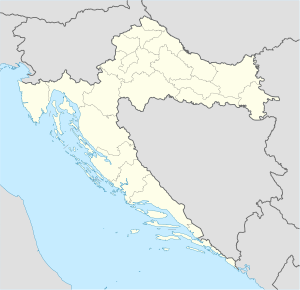| Dalj massacre | |
|---|---|
Dalj on the map of Croatia | |
| Location | Dalj, Croatia |
| Date | 1 August 1991—June 1992 |
| Target | Croatian police and Croatian National Guard prisoners of war, Croat civilians |
Attack type | Mass murder, ethnic cleansing |
| Deaths |
|
| Perpetrators | SAO Eastern Slavonia, Baranja and Western Syrmia Territorial Defence Forces, supported by the Yugoslav People's Army and the Serb Volunteer Guard paramilitaries |
The Dalj massacre was the killing of Croats in Dalj, Croatia from 1 August 1991 until June 1992, during the Croatian War of Independence. In addition to civilian victims, the figure includes 20 Croatian policemen, 15 Croatian National Guard (Zbor narodne garde – ZNG) troops and four civil defencemen who had been defending the police station and water supply building in the village on 1 August 1991. While some of the policemen and the ZNG troops died in combat, those who surrendered were killed after they became prisoners of war. They tried to fight off an attack by the Croatian Serb SAO Eastern Slavonia, Baranja and Western Syrmia (SAO SBWS) Territorial Defence Forces, supported by the Yugoslav People's Army (Jugoslovenska Narodna Armija – JNA) and the Serb Volunteer Guard paramilitaries. The SAO SBWS was declared an autonomous territory in eastern Croatia following the Battle of Borovo Selo just to the south of Dalj.
After the attack on 1 August 1991, the non-Serb civilian population in the village and the surrounding area was persecuted up to June 1992. They were forced to flee their homes, as they would have been imprisoned, physically abused or killed if they did not. After the war, the International Criminal Tribunal for the former Yugoslavia (ICTY) charged high-ranking SAO SBWS and Serbian officials, including Slobodan Milošević and Goran Hadžić, with war crimes committed in Dalj. Two Serbian State Security officials, Jovica Stanišić and Franko Simatović, were convicted for a murder in Daljska Planina in June 1992. The killings were extensively covered by German media leading to forming of a public opinion in support of Croatia. By the end of 1991, Germany adopted support for diplomatic recognition of Croatia as its policy and duty.
